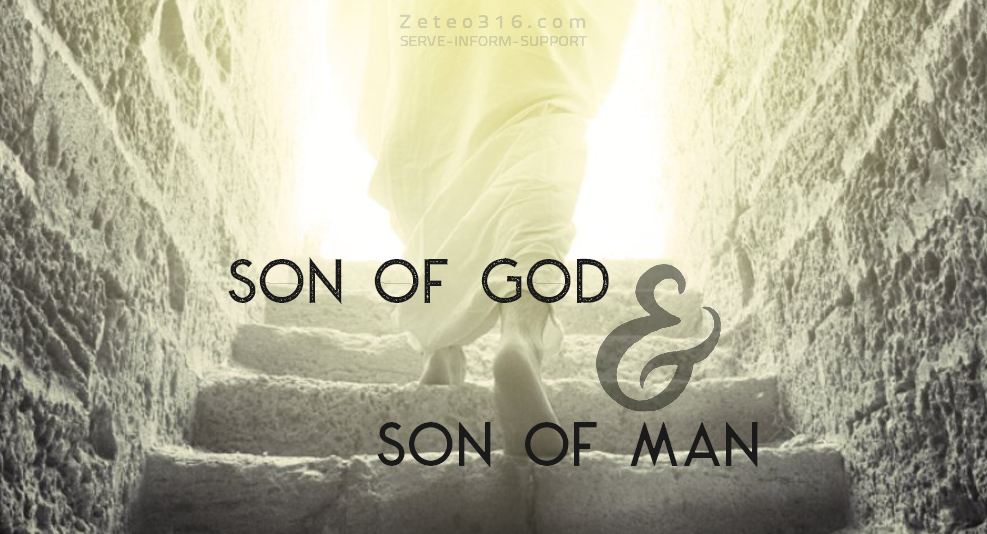
Jesus Christ is referred to as the Son of God and Son of Man. Why is this important?
I’ve been reading through a book which explores the biblical truth of Christ as High King of Heaven. One chapter (by Paul Twiss) begins by noting the importance Shakespeare attributed to the names “Capulet” and “Montague” in Romeo and Juliet.
Twiss notes that their relational problems issue from these names. He paraphrases Juliet and Shakespeare. One asks, “What value is there in a name.” Shakespeare seems to respond, “Very much, my dear. You will lose your life on account of it.”
In Matt 26:57-68 Jesus is asked if He is the Son of God. He not only affirms this, but adds that He is also the Son of Man. The significance is lost on those who deny Christ’s divinity. It wasn’t lost on the Jewish authorities who subsequently demanded Jesus’ death on the charge of blasphemy.
Jesus’ titles are derived from the Old Testament. The Bible (all 66 books) is interconnected. David Limbaugh’s The Emmaus Code does a good job of connecting the Old Testament dots to Christ. I like how Twiss explains it. Imagine a piece of string passing through each book of the Bible, attaching one to all the others. To understand one properly you have to consider all of them.
The titles “Son of God” and “Son of Man” refer to Christ’s “deity” and “humanity.” But according to Twiss there’s more to it than that. Here’s a very brief summary of his points.
“Son of God” is applied to Adam who is made in the image of God. According to Twiss, “Sonship means privilege.” But it also entails responsibility. Adam ultimately failed in his responsibilities.
The “Son of God” theme also occurs in Exodus 4:22 where Israel is called God’s Firstborn Son. Israel failed in its Sonship and responsibility.
David the king – and Davidic Son of God (2 Sam 7) – was intended to mediate between God and Israel. Israel would then “mediate God’s presence to the nations.” Yet David failed as well.
When Adam failed in Genesis 3, he caused mankind’s fall – and also creation. Twiss writes:
The stars in the sky do not shine today as they once did. The seas, oceans, rivers, the rocks, and mountains do not praise God today as they did once upon a time. The most beautiful scene that we could find on planet earth is but a faded sepia image of the universe before the fall.
No wonder we read in Psalm 96:11-13 and Psalm 98:7-9 that creation rejoices at the coming of the LORD. See also Romans 8:19-22.
Jesus also refers to Himself as the Son of Man. Twiss draws attention to Genesis 11 where the phrase “sons of men” first appears. We see in these narratives that man continues to turn his back on his creator. The term “sons of men” is connected to Adam. They are Adam’s sons.
Ezekiel is also referred to as the son of man. Twiss notes that Ezekiel isn’t personally “characterized by wickedness.” He’s a mini-Israel representing the failed sons of men. The act of falling on his face as though dead, and the Spirit reviving him, pictures Israel’s salvation. Ezekiel’s lying on his side for 490 days etc acts out Israel’s future judgment.
Moving forward, Twiss regards Daniel chapter 7 as the “culmination and completion of son of man theology in the Old Testament.” In fact he says salvation history may be understood by what occurs there.
He links the four great beasts which come out of the sea, and the four arrogant earthly kings, through the [fallen] creation lens of Genesis 1-3. These “wicked kings” who oppose God seek power which isn’t rightly theirs. They will ultimately be destroyed.
We also read in Daniel:
And behold, with the clouds of heaven One like a Son of Man was coming, and He came up to the Ancient of Days and was presented before Him. And to Him was given dominion, Glory and a kingdom, that all the peoples, nations and men of every language Might serve Him. His dominion is an everlasting dominion which will not pass away; and His kingdom is one which will not be destroyed. Dan 7:13-14 (NASB)
Notice that the text says One like a Son of Man. Unlike the sons of men whose authority were usurped by the serpent, this Son of Man is victorious. The reason why He succeeds is because He is also the true Son of God.
As Twiss points out:
…in Ancient Near Eastern thought, anyone traveling on clouds was considered to be deity…this Son of Man comes face-to-face with the Ancient of Days. No one has seen God and lived, and yet here is one who stands before Him.
This was a just brief summary. Where all have failed, Jesus was victorious.
As I write this we’re heading to another Good Friday and Resurrection Sunday. It is only through this work of the Son of God and Son of Man, the last Adam (Rom 5:12-18; 1 Cor 15:45-49), that we are redeemed. See Matt 16:15-27 and Luke 9:22.
This is our glorious promise:
But in all these things we overwhelmingly conquer through Him who loved us. For I am convinced that neither death, nor life, nor angels, nor principalities, nor things present, nor things to come, nor powers, nor height, nor depth, nor any other created thing, will be able to separate us from the love of God, which is in Christ Jesus our Lord. Rom 8:37-39
Praise the LORD!
Further reading:
The Astonishing Servant of Jehovah
